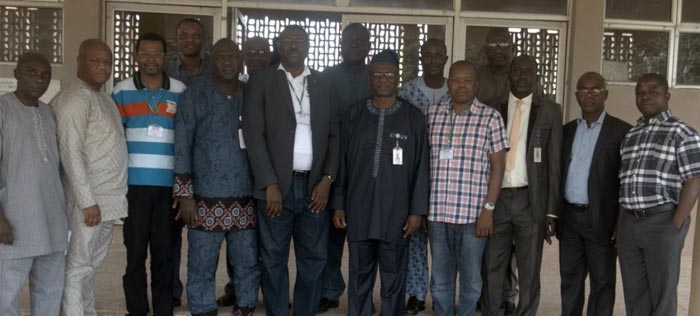Eminent Researchers and Scientists from the National Space Research and Development Agency (NASRDA) and Centre for Atmospheric Research (CAR), were at the Olabisi Onabanjo University, Ago-Iwoye from Thursday, 11th to Friday, 15th November, 2019 to train some selected staff of the University on MATLAB & Magnetic Data Analysis.
The team was led by Professor Babatunde Rabiu, the Director, Centre for Atmospheric Research. Other members of the team included Dr. Daniel Okoh, Assistant Chief Scientist, NASRDA and Dr. E. O. Faluyi, a British trained space scientist.
Explaining the purpose of the training, Professor Babatunde Rabiu said the school on MATLAB and Magnetic Data Analysis was designed to develop capacity building in the usage of MATLAB programming tools, as well as analysis of geomagnetic data, for social-economic development.
Professor Rabiu stated further that this programme was customized for the relevant academic staff, graduate and post-doctoral students of OOU Community. The Director disclosed that about 30 participants were drawn across Colleges and Faculties in Engineering, Science, Agriculture and Social Sciences.
Shedding more light on the concept of MATLAB, Professor Rabiu described it as a contemporary computing technical language, which has wide application in all forms of data analysis, scientific and engineering applications. According to him, it has usage in modern visualization, robotics, machine learning and artificial intelligence research. Eminent Researchers and Scientists from the National Space Research and Development Agency (NASRDA) and Centre for Atmospheric Research (CAR), were at the Olabisi Onabanjo University, Ago-Iwoye from Thursday, 11th to Friday, 15th November, 2019 to train some selected staff of the University on MATLAB & Magnetic Data Analysis.
The team was led by Professor Babatunde Rabiu, the Director, Centre for Atmospheric Research. Other members of the team included Dr. Daniel Okoh, Assistant Chief Scientist, NASRDA and Dr. E. O. Faluyi, a British trained space scientist.
Explaining the purpose of the training, Professor Babatunde Rabiu said the school on MATLAB and Magnetic Data Analysis was designed to develop capacity building in the usage of MATLAB programming tools, as well as analysis of geomagnetic data, for social-economic development.

Professor Rabiu stated further that this programme was customized for the relevant academic staff, graduate and post-doctoral students of OOU Community. The Director disclosed that about 30 participants were drawn across Colleges and Faculties in Engineering, Science, Agriculture and Social Sciences.
Shedding more light on the concept of MATLAB, Professor Rabiu described it as a contemporary computing technical language, which has wide application in all forms of data analysis, scientific and engineering applications. According to him, it has usage in modern visualization, robotics, machine learning and artificial intelligence research.
Professor Rabiu added that the “MATLAB training is a hands-on training that covered introduction to MATLAB & Building Matrices, file processing & MATLAB/Matrix Operations, loops, batch processing of multiple data files and data visualization. He explained further that the capacity building also covered the usage of geomagnetic data for scientific research that borders on geophysical exploration, space weather and monitoring tectonic motion. According to Professor Rabiu, “this training on the use of geomagnetic data was necessary because OOU is now a custodian of a Space Weather and Earth Movement Monitoring Magnetometer installed last year by the Centre for Atmospheric Research”. He revealed that at the end of the capacity building training, participants were expected to become users of MATLAB and geomagnetic data in their individual research endeavour for national development.
Earlier on Wednesday, 10th November 2019, the NASRDA team paid a courtesy visit to the Vice-Chancellor in his office. The Head, Department of Physics, Dr. Kunle Alausa with the members of his Department, led the NASRDA team to a warm reception by the Vice-Chancellor, Professor Ganiyu Olatunde. The Vice-Chancellor appreciated them for bringing good things to the University and most especially, in selecting OOU for the capacity building. Professor Olatunde sought for more partnership with NASRDA and CAR.
He also acknowledged the previous assistance rendered by NASRDA, especially in the area of donation of equipment. The Vice-Chancellor emphasized that by deploying modern tools and equipment to OOU, it will, in conjunction with NASRDA, contribute to the nation’s research activities and national development. He assured Professor Babatunde Rabiu and his team of the readiness of the University to make their stay comfortable and memorable.
In his response, Professor Rabiu expressed the pleasure of his team to be in the University. He disclosed that the Capacity Building Programme was jointly organized by the Centre for Atmospheric Research and Development Agency and the Olabisi Onabanjo University, Ago-Iwoye. Professor Rabiu praised the Vice-Chancellor and the Management for turning the Main Campus into a beautiful environment with good road network, green lawns and serene atmosphere, which he said, gave the University a superb look when compared with other institutions. He said that NASRDA was one of the Research and Development Centres established by the Federal Government, with a focus on Satellite Meteorology to study atmospheric and weather sciences using satellite data to facilitate the effective management of its environment. Professor Rabiu promised that NASRDA would continue to facilitate capacity building, deployment of equipment and explore more opportunities through the collaborative efforts of both institutions.
He, therefore, congratulated the University for being a beneficiary of the Centre’s gesture, which undoubtedly, would promote teaching and research activities in OOU.

